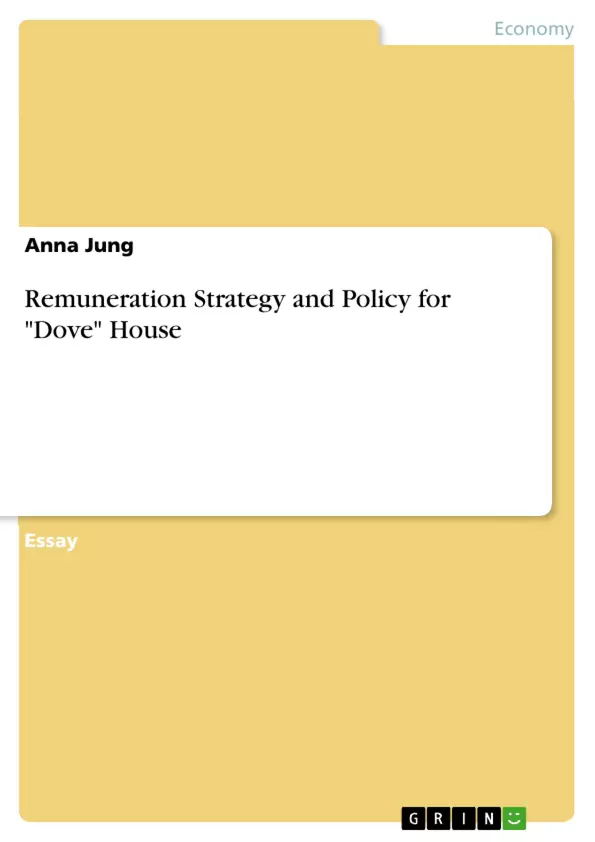The present report aims to outline the reward strategy and policy for Unilever’s new business
division, i.e. a store in central London for Unilever’s largest Personal Care brand Dove. The
reward strategy and policy are designed to motivate the Dove House employees to provide an
excellent service to our customers and hence to ensure a successful establishment of this
unique store concept. If this aim will be achieved, further stores in the UK and other countries
will be considered.
Accordingly, an effective reward management system, which is aligned both with the overall
business strategy and other HR practices, is vital to ensure the engagement, commitment and
high levels of performance of all our employees and will be proposed in this report.
Inhaltsverzeichnis (Table of Contents)
- Introduction
- About Unilever
- Opening a Dove House in London
- Reward Strategy
- Reward Goals
- External Market Competitiveness
- Promoting our Performance Culture
- Promoting Teamwork and our Values
- Promoting Learning and Development
- Engagement and Satisfaction
- Rewarding Managerial Employees
- Rewarding Shop Floor Employees
- Massage Therapists and Cosmetologists
- Customer Service Assistants and Cashiers
- Rewarding Collaboration
- Collective Rewards
- Non-Financial Rewards
- Implementation
- Ensuring Reward Effectiveness
- Equity, Fairness and Transparency
- Employee Involvement and Communication
- Line Manager Training
- Evaluating Reward Effectiveness
Zielsetzung und Themenschwerpunkte (Objectives and Key Themes)
This report outlines a reward strategy and policy for Dove House, a new store concept for Unilever's largest Personal Care brand, Dove. The primary goal is to create a system that motivates employees to deliver exceptional customer service, ensuring the success of this unique store concept.- Designing an effective reward management system aligned with overall business strategy and HR practices.
- Promoting a performance culture that encourages high levels of employee engagement and commitment.
- Developing a reward strategy that addresses the specific needs of managerial and shop floor employees.
- Ensuring equitable, fair, and transparent reward policies.
- Implementing effective communication and feedback mechanisms to foster employee engagement and satisfaction.
Zusammenfassung der Kapitel (Chapter Summaries)
- Introduction: This chapter introduces Unilever as a multinational consumer goods company, highlighting its four main divisions and its business strategy, which includes a vision to double in size while reducing its environmental footprint and increasing its positive social impact. Unilever's virtuous circle of growth is presented, demonstrating how they derive profit from their business model. The chapter also emphasizes the importance of Unilever's values, which guide their employees in their decision-making.
- Reward Strategy: This section outlines the overall reward strategy, focusing on its goals, which are to enhance external market competitiveness, promote a performance culture, encourage teamwork and shared values, foster learning and development, and ensure employee engagement and satisfaction.
- Reward Strategy for the Dove House Employees: This chapter delves into the specific reward strategies designed for employees working at Dove House. It distinguishes between managerial and shop floor employees, detailing the different types of rewards implemented for each group, including financial and non-financial incentives. The chapter also emphasizes the importance of collaborative rewards and the role they play in fostering a sense of community and shared purpose.
- Reward Policy: This chapter focuses on the implementation of the reward strategy, emphasizing the importance of equity, fairness, and transparency. It also highlights the role of employee involvement, communication, line manager training, and the evaluation of reward effectiveness.
Schlüsselwörter (Keywords)
This report focuses on the strategic implementation of a comprehensive reward system for Unilever's Dove House store concept. Key terms and concepts include reward strategy and policy, employee motivation, performance culture, engagement and satisfaction, external market competitiveness, and effective communication. The report emphasizes the importance of aligning reward strategies with overall business objectives and HR practices to ensure a successful and sustainable business model.Frequently Asked Questions
What is the primary objective of the Dove House reward strategy?
The primary goal is to motivate Dove House employees to provide excellent customer service, ensuring the successful establishment of Unilever's unique store concept in London.
Which employee groups are covered in the reward strategy?
The strategy distinguishes between and addresses the specific needs of both managerial employees and shop floor staff, including massage therapists, cosmetologists, customer service assistants, and cashiers.
What are the key goals of the general reward strategy at Unilever?
The goals include enhancing external market competitiveness, promoting a performance culture, encouraging teamwork and shared values, fostering learning and development, and ensuring employee engagement and satisfaction.
Does the strategy include non-financial rewards?
Yes, the report details both financial and non-financial incentives as part of the reward strategy for Dove House employees.
How does the policy ensure the effectiveness of the rewards?
Effectiveness is ensured through equity, fairness, transparency, employee involvement, effective communication, line manager training, and regular evaluation of the system.
Why is teamwork emphasized in the reward system?
The strategy emphasizes collaborative rewards to foster a sense of community and shared purpose among employees, which is vital for the store's success.
- Arbeit zitieren
- Anna Jung (Autor:in), 2014, Remuneration Strategy and Policy for "Dove" House, München, GRIN Verlag, https://www.grin.com/document/275400



